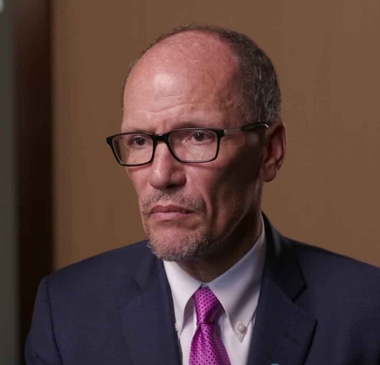The one big problem Democrats didn't solve with their 2020 debate schedule

The debates are coming! The debates are coming!
On Thursday, roughly 13 months before a single ballot will be cast in the Democratic presidential primary process, the Democratic National Committee announced a plan to hold 12 total debates during the nomination fight. There will be six debates in 2019 -- beginning in June -- and another six in 2020.
"My goal in this framework is to give the grassroots a bigger voice than ever before," said DNC Chair Tom Perez of the plan, which matches the number of debates Republicans held in their 2016 primary fight and increases the number Democrats held in 2016 by three.
It seems like an elegant solution to the twin problems faced by the party establishment going into 2020:
- The lingering criticism of the DNC for coordinating the primary debate schedule with Hillary Clinton's campaign (and not the campaign of Bernie Sanders or any other candidate) in the 2016 contest.
- The likelihood that the 2020 Democratic field will be the largest -- and maybe twice as large -- as any other group of candidates who have ever sought the party's presidential nod. (I recently counted 31 credible, serious contenders for the Democratic nomination.)
Notice that I used the word "seems" above. Because while the DNC is smart to try to get in front of the cavalcade of candidates and criticism that will come in a rush at the start of the new year, the party has left one very, very large question unanswered: Who gets included -- and why?
The DNC press release announcing the "debate framework" only lightly hints at the criteria for inclusion; "candidates will qualify for the first two debates by meeting criteria that include both polling and other objective measures that reflect a candidate's support, such as grassroots fundraising," according to the proposal.
Like I said, vague. How much fundraising is enough fundraising to make the cut? And what does "grassroots" fundraising mean? Does that mean that a candidate who has a lot of maxed-out contributors might lose out on a debate spot to one that has a broader small-dollar fundraising network -- even if the former raised marginally more money than the latter?
And when it comes to polling, how will the distinction be drawn between who makes the cut and who doesn't? Does a candidate with 6% support in a national poll really have considerably more backing -- or more chance of winning -- than a candidate who is at 4%, or even 3%? And with so many candidates likely to be in the race, the party could be threading an even finer needle than that, determining that a candidate with 8% is in and one with 7% is out.
Whoever draws the line, and wherever they draw it, will piss off a whole bunch of Democrats. And they will fight like hell to argue their way onto the debate stage.
Then there's this line, tucked near the end of the DNC"s debate release:
"In the event that the qualifying field of candidates requires these debates to be held over multiple nights, the lineup for each night will be determined at random, with qualifying candidates assigned one night per debate. The random selection of candidates will be done publicly."
Oh, really?
First of all, the idea of a live draft for who gets in what debate on what night is super intriguing to me and I will absolutely watch and offer live commentary.
Second, this random selection of who makes what debate on what night is rife with potential pitfalls. What if, say, former Vice President Joe Biden, the nominal front-runner in the race, winds up on a debate stage with a bunch of people trying to break out of the second -- or even third -- tier? The entire debate would become a battle to see who could dunk the hardest on the front-runner.
Because these are Democrats, no one is likely to complain -- at least right now -- about the randomness by which the debate fields will be set assuming there are too many credible candidates for one stage (and there will be). But make no mistake: If the draw doesn't favor a certain candidate come next June, you can bet that there will be loud complaints about how the process is fatally flawed.
The simple truth is this: There's no good way to set up a debate schedule when there are this many likely candidates running. But by glossing over the specifics on how candidates will qualify for the debates, the DNC is setting itself up for a world of pain next summer.
Analysis by Chris Cillizza, CNN Editor-at-large. The-CNN-Wire™ & © 2018 Cable News Network, Inc., a Time Warner Company. All rights reserved.
The Gayly – December 20, 2018 @ 4:15 p.m. CST.





